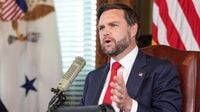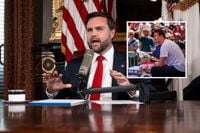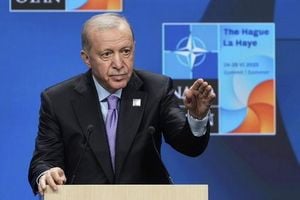On Monday, September 15, 2025, the Eisenhower Executive Office Building adjacent to the White House hosted an unusual scene: Vice President J.D. Vance, somber yet resolute, sat behind the microphone of The Charlie Kirk Show, filling in for a friend whose absence was felt by millions. The occasion was a poignant tribute to Charlie Kirk, the 31-year-old founder of Turning Point USA, who was assassinated just five days earlier during a campus event at Utah Valley University in Orem, Utah.
Kirk’s death sent shockwaves through the American political landscape. Known for his dynamic presence as a conservative activist and a mentor to young conservatives, Kirk was more than just a figurehead—he was, in Vance’s words, a “visionary” and a “luminary.” The vice president made it clear: “If it weren’t for Charlie Kirk, I wouldn’t be vice president of the United States.” The tribute podcast, broadcast live for two hours from the vice president’s ceremonial offices, drew an audience not just of listeners, but of guests who had worked closely with Kirk and felt the depth of his loss.
Among those joining Vance were White House Press Secretary Karoline Leavett, Health and Human Services Secretary Robert F. Kennedy Jr., and White House Deputy Chief of Staff Stephen Miller. The show began with a moving montage of Kirk’s career, set to memorial music and featuring images of Kirk with his family, President Trump, and Vance himself. “Thank you, Charlie,” read the closing message—simple, but heavy with meaning.
Vance’s words throughout the broadcast were both a eulogy and a rallying cry. “I can’t promise you this is going to be easy, can’t promise you that all of us will avoid Charlie’s fate, can’t promise you that I will avoid Charlie’s fate, but the way to honor him is to shine the light of truth like a torch in the very darkest places. Go do it!” he exhorted listeners. He described the challenge of “filling in for someone who can’t be filled in for,” but insisted that Kirk’s mission—“to tell the truth, to stand for conviction, to fight for America”—must continue.
The podcast also became a forum for broader political commentary, with Vance sharply criticizing what he described as a culture of political violence. “People on the left are much likelier to defend and celebrate political violence,” he claimed, warning that focusing on Kirk’s controversial past statements, rather than condemning his murder, risked making “another shooting more likely.” He went so far as to urge listeners to “call out” and even “call the employer” of anyone who celebrated Kirk’s assassination. “We don’t believe in political violence, but we do believe in civility. And there is no civility in the celebration of political assassination,” Vance declared.
Stephen Miller, echoing the administration’s hardline stance, pledged “every resource we have at the Department of Justice, Homeland Security and throughout this government to identify, disrupt, dismantle and destroy these networks” responsible for violence. The administration’s response, Miller said, would target not only individuals but also “NGOs linked to political unrest.”
The emotional toll of Kirk’s death was evident. Vance choked up as he recounted a conversation with Kirk’s widow, Erika, who asked his wife how to tell their children that their father had been murdered. “She said to me that Charlie never raised his voice, that he never cussed at her, that he was never cross or mean spirited to her,” Vance reflected. “Maybe the best way that I can contribute and the best way that I can honor, my dear friend, is to be the best husband that I can be, to be the kind of husband to my wife, that he was to his.”
Kirk’s influence extended far beyond his immediate family and friends. Robert F. Kennedy Jr., now Health and Human Services Secretary, credited Kirk for persuading him to take his cabinet role. “Charlie was probably the primary architect in my unification with President Trump,” Kennedy said. White House Press Secretary Karoline Leavett praised Kirk’s impact on youth engagement, noting, “The president loved Charlie deeply… Charlie played an instrumental role in returning the president to the Oval Office.”
Tributes poured in from outside politics as well. Actor Chris Pratt posted a prayer video, urging viewers to “pray for Charlie Kirk right now, for his wife and young children, for our country. We need God’s grace. God help us.” Rainn Wilson, star of The Office, called for unity and warned of the dangers of political division, saying, “I didn’t always agree with him, but this whole idea of ‘I’m going to kill someone that I disagree with’ is disgusting and dangerous.”
The investigation into Kirk’s assassination has moved swiftly. The FBI, led by Director Kash Patel, announced that DNA evidence linked 22-year-old Tyler Robinson, the suspect, directly to the scene. Robinson, a Utah resident whose family reported a recent shift toward left-wing political views, allegedly confessed in a private Discord chat before his arrest. Bullet casings recovered at the scene bore anti-fascist messages, and authorities described Robinson’s beliefs as aligned with “a leftist ideology.” He remains in custody, refusing to cooperate with law enforcement interviews.
The political fallout has been immediate and intense. Former President Donald Trump, who credited Kirk with helping him reach younger voters through TikTok, described Robinson as “radicalized over the internet” and “on the left.” Trump announced he would likely speak at Kirk’s funeral, scheduled for September 21 at State Farm Stadium in Glendale, Arizona—a public memorial expected to draw tens of thousands and requiring extraordinary security measures.
Meanwhile, the assassination has intensified partisan rancor. Republican Rep. Buddy Carter introduced a resolution to remove Democratic Rep. Ilhan Omar from her committee assignments over her remarks about Kirk’s record, while Utah Democrats reported a wave of threats following the shooting. Vigils and rallies, such as the “We Are All Charlie Kirk” event at the University of Alabama, have been organized to honor Kirk’s legacy and inspire continued activism. Conservative commentator CJ Pearson, organizing the rally, stated, “Charlie was all about free speech, and this rally is to remind people that we must continue to speak up, as Charlie would have wanted.”
Turning Point USA, the organization Kirk founded, has released a line of memorial merchandise, with proceeds supporting the causes he championed. White House Chief of Staff Susie Wiles highlighted Kirk’s role in mobilizing young voters during the 2024 Trump campaign, saying he “reached every college campus in every part of the country.”
As the nation prepares for Kirk’s funeral, security officials are on high alert. The Secret Service is coordinating with local authorities to secure the 63,000-seat venue, designated a potential national special security event. The timing is particularly fraught, with other high-profile events—including a state visit to the UK and the United Nations General Assembly—requiring simultaneous protection efforts.
In the wake of tragedy, voices across the spectrum—political allies, critics, and cultural figures—have called for reflection and, in some cases, reconciliation. Yet the questions raised by Kirk’s assassination linger: about the boundaries of political discourse, the dangers of polarization, and the challenge of honoring a legacy without deepening divisions. As Vice President Vance concluded, “The way to honor him is to shine the light of truth like a torch in the very darkest places.”






